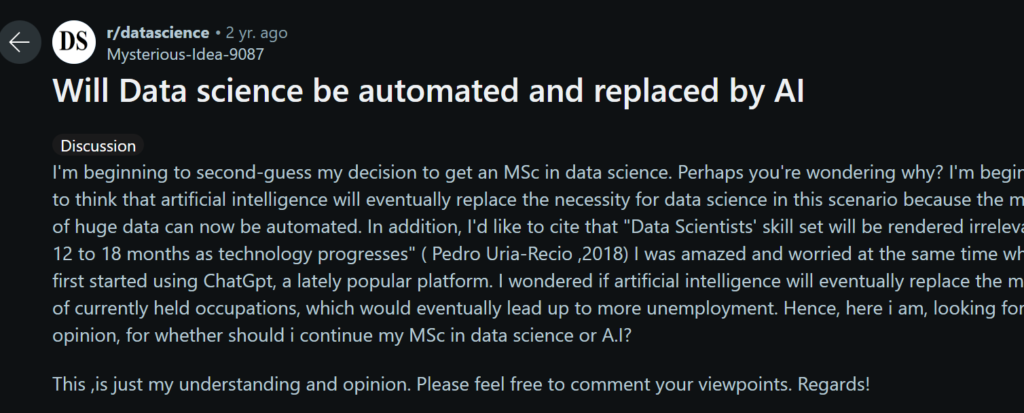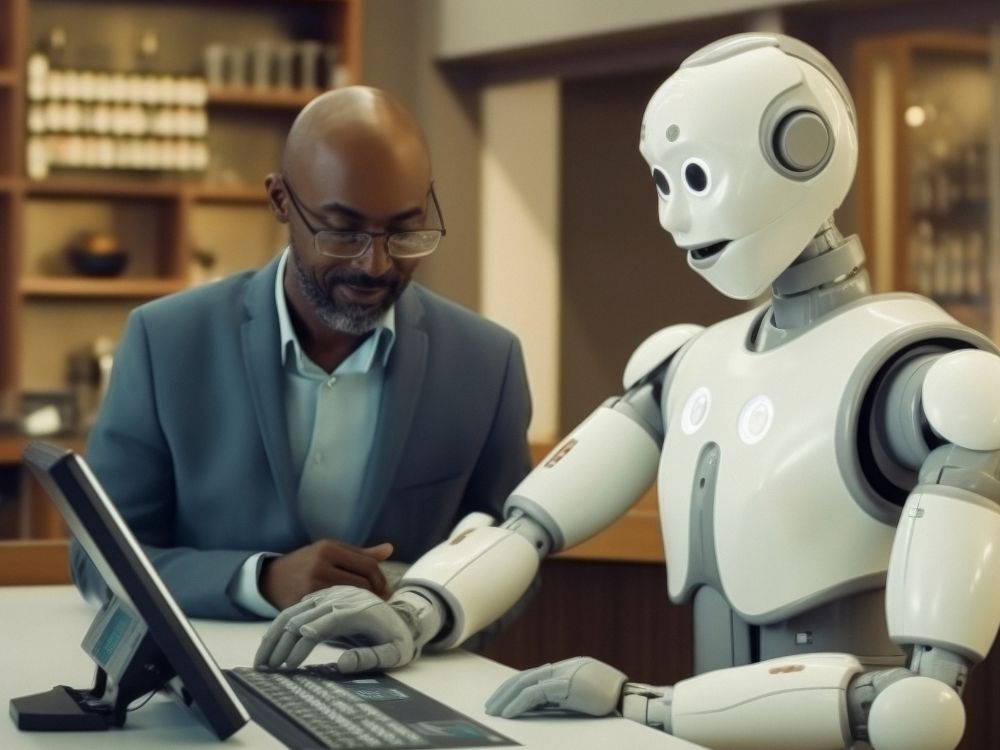Will AI Replace Data Scientists?
Will AI replace data scientists? Explore how AI impacts the future of data science, the roles of data scientists, and the opportunities for growth in this evolving field.
If you’re in the field of data science or thinking about entering it, you might be wondering if artificial intelligence (AI) will replace data scientists. It’s a hot topic and one that’s causing quite a stir. As AI continues to advance, it’s natural to wonder if it will eventually make data scientists obsolete. Let’s dive into this question and explore some common concerns like, “Can artificial intelligence replace data scientists?” and “Is AI a threat to data scientists?” By the end of this discussion, you’ll have a better understanding of where things stand and what the future might hold for data scientists.
Can Artificial Intelligence Replace Data Scientists?
So, can AI really take over the job of a data scientist? The short answer is no, not entirely. Sure, AI can handle some of the tasks that data scientists do. It can process data, find patterns, and even predict outcomes based on those patterns. But here’s the thing: AI lacks human intuition and creativity. These are qualities that are crucial when it comes to solving complex problems, especially in business settings.
Think about it this way: AI is a tool. It’s a powerful tool, no doubt, but it still needs a human to guide it, interpret the results, and make strategic decisions based on those results. Data scientists don’t just crunch numbers; they use their expertise to understand the business context and provide insights that can drive real change. They make connections, question assumptions, and come up with innovative solutions that AI alone just can’t manage. So, while AI can support and enhance the work of data scientists, it’s unlikely to fully replace them.
Is AI a Threat to Data Scientists?
Now, you might be wondering if AI poses a threat to the job security of data scientists. The reality is that AI does have the potential to automate certain aspects of the data science role, particularly the more repetitive tasks like data cleaning and preprocessing. These are time-consuming tasks that AI can handle quite efficiently, which might reduce the demand for entry-level data science positions that focus on these activities.
But instead of seeing AI as a threat, consider it an opportunity. With AI handling the mundane tasks, data scientists can shift their focus to more strategic, high-value activities. This might include overseeing AI implementations, ensuring data integrity, and addressing ethical considerations around data usage. Data scientists who can adapt and expand their skills to include these responsibilities will find themselves in even greater demand. The field is evolving, and those who grow with it will thrive.
Which Is the Future: AI or Data Science?
Here’s a question that often pops up: should you focus on AI or data science for the future? The truth is, it’s not about choosing one over the other. AI and data science are two sides of the same coin. They complement each other beautifully. AI leverages data science principles to function. In turn, data science uses AI to analyze more complex data sets and generate deeper insights.
As a data scientist, you’re building the foundation for AI. You need to understand machine learning, a key component of AI, to create models that can learn and make predictions. Data science gives you the tools and techniques to work with big data, which AI then uses to drive automation and efficiency. In short, both fields are intertwined, and being knowledgeable in both areas will position you at the forefront of technological innovation.
Can AI Be a Data Scientist?
You might be asking yourself if AI can completely step into the role of a data scientist. AI can perform some of the tasks that data scientists do, like analyzing data and making predictions. However, calling AI a “data scientist” would be a stretch. Here’s why: data scientists bring a unique combination of skills to the table. They blend technical expertise with business understanding and problem-solving abilities. AI, no matter how advanced, doesn’t possess the human intuition, creativity, or critical thinking needed to connect the dots in the way a skilled data scientist can.
Sure, AI can crunch numbers faster than any human, but interpreting those numbers and understanding their impact on real-world business scenarios? That’s where human data scientists shine. They can take the insights generated by AI and translate them into actionable strategies, ensuring those insights align with business goals and objectives.
Who Are Data Scientists?
If you’re still wondering what makes data scientists so valuable, let’s break it down. Data scientists are experts in handling data – from collecting and cleaning it to analyzing and interpreting it. They use programming languages like Python, R, and SQL to manipulate data, apply mathematical and statistical techniques to find trends, and use tools like Tableau and Matplotlib to visualize their findings.
Beyond their technical skills, data scientists are problem solvers. They are curious, analytical, and always looking for ways to improve processes and outcomes. Whether it’s predicting customer behavior, optimizing supply chains, or identifying new market opportunities, data scientists play a crucial role in turning raw data into actionable insights. They are the bridge between data and decision-making, ensuring that businesses can make informed choices based on real evidence.
Key Skills of Data Scientists:
- Programming Knowledge: Proficiency in languages like Python, R, and SQL is essential. These languages help you manipulate data and create algorithms for better data collection and analysis.
- Data Wrangling: A major part of a data scientist’s job is to clean and prepare data. This includes handling missing values, identifying outliers, and ensuring consistency.
- Statistics and Mathematics: A solid understanding of these subjects is vital. They form the backbone of data analysis and model-building.
- Data Visualization: Being able to present findings in a way that others can easily understand is crucial. Tools like Tableau, Seaborn, and Matplotlib help create visual representations of data.
- Machine Learning: Knowing how to build and train machine learning models is a must for solving complex problems and making predictions based on data.
What Does a Data Scientist Do?
If you’re considering a career in data science or are already in the field, you know that data scientists wear many hats. They collect and clean data, analyze it to find trends, build models to predict future outcomes, and communicate their findings to stakeholders. Their work is essential for helping businesses make data-driven decisions.
Here’s what a typical data scientist’s job might involve:
- Identifying Problems: Data scientists start by understanding the business questions that need answers. They figure out what data is required and how to approach the problem.
- Data Cleaning and Mining: They clean the data to ensure it’s usable, then mine it to extract valuable information.
- Model Development: Data scientists create models to predict outcomes or identify trends. They test these models, refine them, and apply them to real-world scenarios.
- Visualization and Reporting: Communicating results through graphs, charts, and dashboards is key. This helps decision-makers understand the findings and take action.
- Collaboration and Leadership: Data scientists often work in teams with data engineers, business analysts, and IT professionals. Effective communication and teamwork are critical.
Will Data Science Be in Demand in the Future?
Data science isn’t just a buzzword; it’s a field that’s growing rapidly and showing no signs of slowing down. The demand for data scientists is high and is expected to stay that way. With the explosion of digital technologies, businesses across all industries need skilled professionals who can analyze data and extract insights to drive strategic decisions.

Here is a reddit discussion with the last comment 2 years ago. It seems ChatGPT got better than when it was created.
The World Economic Forum has predicted that data scientists and analysts will continue to be among the most sought-after professionals. As AI, machine learning, and big data technologies evolve, so too will the demand for data scientists. Industries like healthcare, finance, technology, and research will always need experts who can turn vast amounts of data into actionable insights.
What about the demand in 2030? It’s expected to grow even more. Data science skills will be crucial in sectors like healthcare for predicting disease outbreaks, in finance for fraud detection, and in technology for optimizing operations. The possibilities are endless, and the career opportunities will continue to expand.
Will AI Replace Data Engineers?
While AI can automate certain tasks that data engineers handle, like data integration and pipeline maintenance, it won’t replace the need for skilled data engineers. AI can assist with routine tasks, but the complex problem-solving and infrastructure design that data engineers perform are still beyond AI’s capabilities. Data engineers are essential for building and maintaining the data infrastructure that powers AI systems.
Is Data Science AI-Proof?
No field is completely immune to the influence of AI, but data science is more resilient than most. Why? Because data science is rooted in human creativity, critical thinking, and deep domain knowledge. These are aspects that AI can’t easily replicate. The need for ethical considerations, bias detection, and contextual understanding ensures that data scientists will continue to play a key role in interpreting and validating AI-generated insights.
Conclusion
The question of whether AI will replace data scientists is not about if but how AI will change the nature of data science roles. AI will undoubtedly automate some tasks, but it will also open up new opportunities for data scientists to focus on higher-level strategic responsibilities. As a data scientist, adapting to these changes and continuously enhancing your skills will make you indispensable.

If you’re looking to create compelling, SEO-friendly content on topics like data science and AI, you’re in the right place. As a top-rated plus tech content writer, I specialize in making complex tech topics engaging and easy to understand. Whether you need articles, ghostwriting services, or other tech-related content, I’m here to help you craft content that stands out. Let’s work together to bring your ideas to life and position you as a thought leader in your industry. Reach out today to discuss your project!
Also read: Will AI Replace Teachers?

